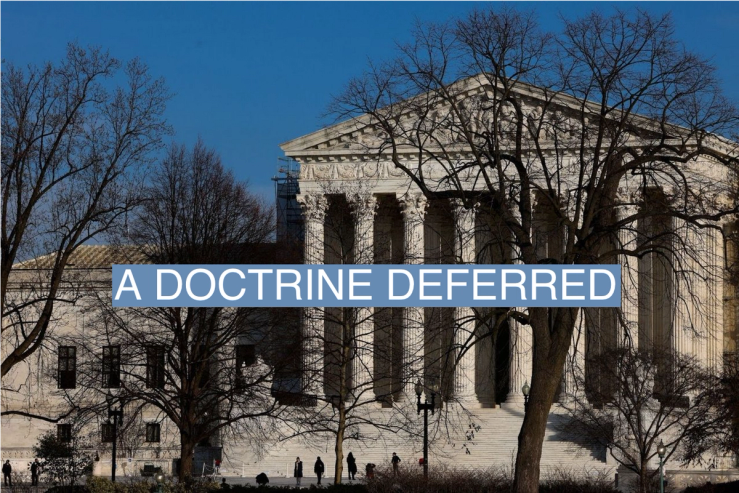The News
The U.S. Supreme Court seems likely to restrict or toss out a 40-year legal precedent that shields many key environmental and climate policies from being rolled back. If it does, it will hand Donald Trump a major, delayed victory from his first term — and make it easier for a potential second Trump administration to dismantle President Joe Biden’s climate agenda.
Justices heard arguments this week in a pair of lawsuits against the government challenging “Chevron deference,” which requires judges to defer to the expertise of federal agencies in cases where there is an ambiguity in the law during a dispute.
But in Wednesday’s hearing, the court’s conservative majority contested that concept, arguing that it hands too much power to bureaucrats and inevitably leads to damaging policy reversals every time the White House changes parties. A decision on the doctrine’s fate is expected by July.
In this article:
Tim’s view
If the court overturns Chevron — which takes its name from a 1984 dispute between the oil major and an environmental group over vague language in air-pollution regulations — it would be open season for fossil-fuel trade groups and others to pick apart Biden’s climate regulations, even if he wins a second term. And it would put a chilling effect on future regulations, as agency staff will be forced to tread more cautiously, with the expectation of having their work picked apart by judges.
Climate politics in the U.S. is so divisive that new laws are rare; the Inflation Reduction Act offers plenty of incentives for clean energy, but the government’s ability to police high-emissions industries mostly comes from old laws like the Clean Air Act. That means the Obama and Biden administrations’ forays into fighting climate change have depended heavily on what the U.S. Environmental Protection Agency and other bodies can get away with under existing law, leaving those policies vulnerable to legal attacks. Chevron deference is key to their survival, because climate regulation often turns on arcane, highly technical details and data that neither legislators nor courts are well-suited to understand.
Scrapping Chevron has been a longtime priority for conservative groups, which seized Trump’s first term to appoint a raft of judges and justices opposed to administrative overreach. Without Chevron, those judges will get buried in geoscience and engineering homework, and it will be much more difficult even for the most well-intentioned Congress to make progress on fighting climate change, said Michael Gerrard, director of Columbia University’s Sabin Center for Climate Change Law.
Limitations on methane emissions proposed by the EPA in December would be among the first Biden climate regulations to face post-Chevron lawsuits, as well as new standards for emissions from vehicles and power plants, both expected this year. Forthcoming rules from the U.S. Securities and Exchange Commission on corporate carbon disclosures would also have much weaker legal footing. And fossil-fuel industry groups would have a better shot at tearing down Treasury Department rules for clean-energy tax credits under the Inflation Reduction Act, especially those determining which electric vehicles can qualify for tax credits and those defining what counts as “green” hydrogen.
“Overturning Chevron will make it even more difficult for the Biden administration to pursue its ‘whole of government’ approach for dealing with climate change, which is really at odds with the court’s view of what the executive branch can do,” said Jeffrey Holmstead, a partner at at the law firm Bracewell and former assistant administrator of the EPA.
Without Chevron, agencies will be a lot more “gun-shy” in their reading of the law, and Republican members of Congress who are open to enacting climate laws will be disincentivized to do so because of how prescriptive those laws will need to be to survive legal challenges, said David Doniger, the senior attorney at the Natural Resources Defense Council who helped lead the original case against Chevron.
Supporters and opponents of climate policy would have to engage in careful “forum-shopping,” he said, bringing cases to complain that agencies are doing too much or too little on climate to courts they think are likely to agree with their policy preferences. That might occasionally yield a win for environmentalists, for example if a liberal-leaning federal judge in California found that a Republican administration’s interpretation of the Clean Air Act fell far short of the law’s requirements. But because laws are generally short on details, the absence of Chevron deference would be more likely to impede climate ambition than support it.
“This is a recipe for even more chaotic decision-making than we currently get, with a lot less predictability for companies that are subject to environmental laws and the people who are supposed to benefit from them,” Doniger said.
Room for Disagreement
Rather than scrapping Chevron altogether, it’s possible the justices will simply give courts more leeway to rule that an agency’s reading of a law is reasonable or not, without necessarily requiring them to rehash every technical detail. And they may set a very high bar for the circumstances under which longstanding environmental regulations could be newly challenged, Holmstead said.
Either way, the decision may not matter much for the biggest cases — the Supreme Court itself already routinely flaunted Chevron deference, including in a 2022 decision in which it ruled against Obama-era emissions regulations.
“It’s been several years since the court has said it was deferring to an agency interpretation of a regulation,” Gerrard said. “So the explicit overruling of Chevron may not change the actual outcomes in many cases that reach the Supreme Court. But it would embolden those challenging regulations in the lower courts.”
The View From Montana
Climate advocates won a victory this week in an unrelated case in Montana. The state’s top court ruled against an attempt by its governor to block a lawsuit by youth activists arguing the state has failed in its constitutional obligation to protect the environment. The state is appealing a decision against it in that case by a lower court last year; that hearing is scheduled for mid-February.


